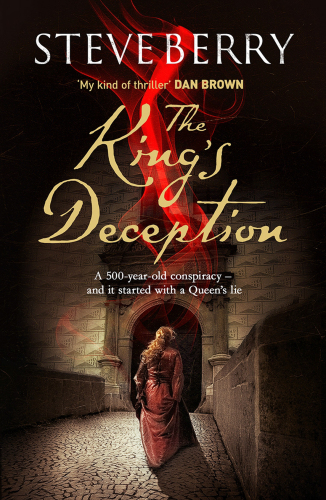 The King’s Deception is a Dan Brown-esque conspiracy thriller that centres on one of British history’s most intriguing political conspiracy theories. FULL SPOILERS AHEAD…
The King’s Deception is a Dan Brown-esque conspiracy thriller that centres on one of British history’s most intriguing political conspiracy theories. FULL SPOILERS AHEAD…
There are two reasons why I wanted to read The King’s Deception. 1. Because of its parallels with Million Eyes, my own forthcoming conspiracy thriller with historic British conspiracy theories at its core. 2. Because I read a fascinating article about it in the Daily Mail.
I wrote an article about this theory myself a while back. It was entitled, Queen Elizabeth I was actually a man in drag. Yes, you read that right. This isn’t a new theory. In fact, the first person to put the theory in print was none other than Bram Stoker, author of Dracula, who described the legend of “the Bisley boy” in his 1910 non-fiction book Famous Imposters.
The story goes that Elizabeth I was sent by her father, Henry VIII, to stay in the village of Bisley to escape a bubonic plague outbreak in London. She was 10 years old at the time. While in Bisley, she fell sick with an unknown illness and died. Her minders, terrified that Henry VIII would blame them, replaced Elizabeth with a lookalike. As it happened, the only person in Bisley who looked vaguely like the princess was a boy.
Proponents of the theory argue that this is why Elizabeth, as queen, never married or bore children. Why she always wore wigs and heavy makeup. Why she only let a couple of trusted physicians attend to her, and ordered that no autopsy be undertaken after her death. And why during May Day celebrations in the village of Bisley, the May Queen is always played by a boy in Elizabethan costume.
While The King’s Deception has numerous point-of-view characters, the main one is Cotton Malone, a former agent for the US Justice Department. He and his son, Gary, become entangled in a CIA operation called King’s Deception, which is trying to expose a centuries-old mystery to blackmail the British and stop them from releasing of a Libyan terrorist. That mystery being (we learn later) that Elizabeth I was an imposter.
I came to The King’s Deception as someone interested in this conspiracy theory and having read some of the book’s publicity. I may have enjoyed it more had I not known about the theory beforehand, as it remains a mystery throughout much of the book. This isn’t the book’s fault though, and the blurbs on the back and on Steve Berry’s website do not reveal the secret, so plenty of readers will be none the wiser.
And while I knew what the mystery was, I still enjoyed how the plot unfolded. It was fast-paced and action-packed, and I liked the occasional rewinds to Tudor times (though I didn’t like how they were always relayed in italics—I didn’t think that was necessary). Most of the characters were well-drawn, particularly bolshie British SOCA agent Kathleen Richards and CIA agent Blake Antrim, a selfish, violent misogynist and the book’s main villain. In fact, it was probably the main character, Cotton Malone, who struck me as the blandest. If I was asked to describe his character, I’m not sure what I’d say.
Still, Malone was readable and some of the character-based stuff involving his son Gary finding out that Malone wasn’t his biological father stopped his sections from being boring.
There weren’t any major plot twists or surprises but there were a few minor ones. I liked finding out that Blake Antrim was Gary’s real father. It presented an interesting dilemma, and I enjoyed watching Antrim go from being determined to have a relationship with Gary—and wanting Malone dead to ensure that—to not caring one jot. It was in keeping with his character. I liked finding out that the Daedalus Society—the historic conspirators protecting the Virgin Queen’s secret—was actually just an invention cooked up by evil head of MI5 Thomas Mathews and his cohorts to frighten Antrim.
 I also liked learning about why Elizabeth’s secret was so dangerous for the British, were it to be exposed. The fact that it was all to do with fears that the Troubles in Northern Ireland would start up again hadn’t occurred to me. Throughout the book I’d been wondering whether exposure of the secret would have much effect. But of course it would. Elizabeth I had seized Irish land and given it to English settlers. If her title to the throne was bogus, then so were all her legal actions involving Ireland, giving Irish nationalists a new reason to fight British rule. I really loved this angle and it made perfect sense.
I also liked learning about why Elizabeth’s secret was so dangerous for the British, were it to be exposed. The fact that it was all to do with fears that the Troubles in Northern Ireland would start up again hadn’t occurred to me. Throughout the book I’d been wondering whether exposure of the secret would have much effect. But of course it would. Elizabeth I had seized Irish land and given it to English settlers. If her title to the throne was bogus, then so were all her legal actions involving Ireland, giving Irish nationalists a new reason to fight British rule. I really loved this angle and it made perfect sense.
I had a few problems with The King’s Deception, but not many. There was a wide ensemble of point-of-view characters and I think, at times, we jumped between them too often. In Chapter 61, for instance, we had 8 POV shifts over 6 pages. This was too many, and given that we were in the middle of a high-action fight scene, I think it diminished the tension. Berry should’ve stayed in Malone’s POV.
I was also struggling with Berry’s reluctance to use his characters’ names. He would use them once at the start of each section to tell the reader whose POV we were in. Then he’d use pronouns from that point on. With Kathleen it was easy. In most scenes, she was the only “she”. But the abundance of male characters meant that when Berry kept saying “he”, I wasn’t always certain who he was talking about. And because he changed POVs on a regular basis, there were times when I had to return to the start of the section to remind myself whose POV we were in.
And Kathleen being one of few “shes” was the next problem for me. The King’s Deception is incredibly male-dominated. Kathleen is the only female POV character, and while there are a number of female supporting characters, most are male. My girlfriend also made this comment—why couldn’t Malone’s son, Gary, have been female? Why couldn’t Ian, the delinquent who’d witnessed an MI5-ordered murder, have been female? Thomas Mathews, head of MI5, wasn’t a POV character, but he was still a prominent and important one. Why couldn’t he have been female?
Still, I enjoyed The King’s Deception. It was a decent conspiracy thriller that would work well as a movie. Actually, it might work better as a movie.
Next week: did Hitler really kill himself, or was he allowed to escape?
Advertisements Share this:





